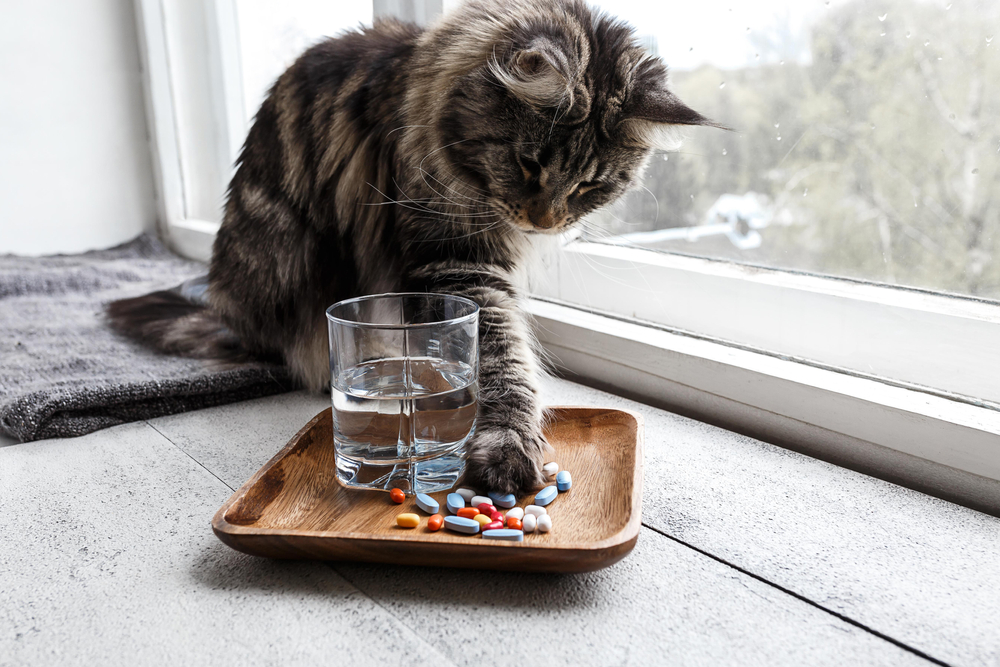If you need more information about Human Medications and Pets: Frequently Asked Questions, you can check the following LINK.

When humans feel sick or develop aches and pains, we take over-the-counter or prescription medications to feel better. When pets get sick, some pet owners want to provide their furry pal with the same relief and they offer them their own medication. Unfortunately, pets who are given human medications or who accidentally ingest them can suffer serious or life-threatening toxic effects. The Town & Country Animal Hospital team knows that you want the best for your pet, so we’re answering your most common questions about how human medications can affect your companion.
Question: What human medications are most dangerous for pets?
Answer: Although veterinarians commonly prescribe human medications for pet ailments, that doesn’t mean that all human medications are safe. Many common human medications are toxic to dogs and cats in any amount, while others must be given in significantly smaller doses to avoid side effects or toxicity. Some of the most common toxic offenders include:
- Acetaminophen (i.e., Tylenol) — This medication may damage red blood cells or the liver.
- Non-steroidal anti-inflammatory drugs (NSAIDs) — Ibuprofen and naproxen can lead to gastrointestinal ulcers and kidney failure.
- Antidepressants — Ingestion or overdose of psychiatric medications can cause a dangerous spike in serotonin levels.
- Cardiovascular drugs — Heart rate, blood pressure, and heart rhythm can be altered.
- ADHD drugs — These medications cause a stimulant effect in pets.
- Over-the-counter cold medications — These may contain toxic ingredients, such as pseudoephedrine, which acts as a stimulant, or acetaminophen (Tylenol).
Q: How can I protect my pet from accidental medication ingestion?
A: Although humans think that pets voluntarily consuming stray pills or seeking out a medication bottle seems crazy, pets are attracted to interesting smells, tastes, and textures. Assume that your pet will find your medications intriguing and store them appropriately, following these tips:
- Keep all medications stored in cabinets or secure containers inaccessible to your pets.
- For mischievous pets who can open doors, consider child latches on your cabinets and drawers.
- Hang up bags, coats, and backpacks instead of tossing them on the floor.
Q: What symptoms should I watch for if my pet ingests a harmful medication?
A: Rather than waiting until symptoms appear, you should take action as soon as you suspect your pet may have consumed a harmful medication. Treating your pet before symptoms appear can reduce the severity of long-term consequences and, in some cases, may save your pet’s life.
If you aren’t aware of medication ingestion but your pet begins acting strangely, check around the house to see if you can find evidence of pet poisoning, and then seek veterinary care. Signs vary greatly, depending on the medication and your pet’s species and size, but may include:
- Hyperactivity
- Lethargy
- Vomiting
- Tremors or seizures
- Increased or decreased heart rate
- Weakness or collapse
- Intoxicated appearance
- Appetite loss
- Increased drinking or urination
Q: Can I give my pet human medications in an emergency?
A: If you feel your pet needs immediate treatment for pain or another health condition, call our office or seek emergency veterinary care. Some medications may be safe and helpful during certain emergencies, but only a veterinary professional can make this call. You may think you are doing the right thing, but giving your pet a human medication without proper instruction can make the situation worse.
Q: What are the alternatives to human medications?
A: Veterinary medicine researchers work hard to determine the human medications effective for pets, and how to adapt them for safety. In some cases, this means simply adjusting the dose range. In other cases, it means altering the drug or creating a new one that works with a pet’s body. Veterinarians have access to these drugs and the knowledge to prescribe them safely.
Q: What should I do if my pet ingests a harmful medication?

A: When your pet ingests something toxic, first call the ASPCA Animal Poison Control Center or the Pet Poison Helpline to open a case and get immediate advice. Take note of your case number, and then call our office or head to your local emergency veterinary clinic if veterinary care is advised. Prompt treatment is crucial for ensuring your furry pal has the best possible outcome.
Educating yourself about medications and other toxins that can negatively impact your pet will help you provide them with a safe, poison-free home environment. Never give your pet human medication without direction from our Town & Country Animal Hospital team. For safe and effective treatment of your pet’s medical concerns, contact us to schedule a visit.
Get even more great ideas about Human Medications and Pets: Frequently Asked Questions by visiting our recommendation website with LINK. Thank you for visiting l2sanpiero.com with article Human Medications and Pets: Frequently Asked Questions. Good luck and see you in the next article